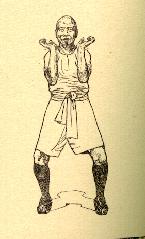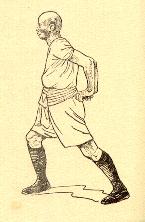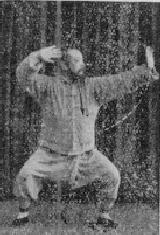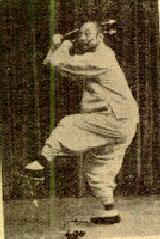SELECTION OF QUESTIONS AND ANSWERS
SEPTEMBER 1999 PART 2

A pattern from the Iron Wire Set of Hoong Ka Kungfu demonstrated by Grandmaster Lam Sai Weng, taken from an old kungfu book recorded by his student Choo Yu Chai. The Iron Iron Set is very effective for developing internal force. It should be learnt personally from a master as faulty practice can lead to serious internal injury.
Question 1
I had a discussion with someone about “being happy”. I said that I feel happy because I'm healthy, I have a lot of friends, I have enough money to support my own living and most of all maybe because I believe in God.
That person didn't believe me. He asked me how could I feel happy if there were a lot of people suffering. After the discussion, I began to read a book “The Art of Happiness” written by the Dalai Lama and an American psychiatrist. The Dalai Lama mentions that friends, health and having enough money are the bassic for happiness. But “mind” is very important. If someone has inner peace he/she will feel happy.
After reading that I just realized that maybe that's also one of the reasons which makes me feel happy. I begin to get my inner peace through chi kung. I think I never can thank you enough for all the things you have taught me. As Daniel and Kay Siang said, just by talking to you we also learn something from you!
— Lanny, Holland
Answer
When I taught you chi kung I knew you would be happy. Being happy is one of the most common feedback I have received from my students who have practised chi kung earnestly.
At one level you were right in saying that your happinese came from being healthy, having a lot of friends and enough money to support yourself, and your belief in God. At another level you were not quite right. There are many people who are healthy, have friends and money, and believe in God, yet are not happy — they often envy their friends and blame God. On the other hand, even if you had no friends and no money, you would still be happy.
From the chi kung perspective, the reason for your happinese is very simple — and profound! You are happy because you have opened your heart. That is also why you do not need any medication for your heart now — although “heart” in chi kung context means more than just the physical organ. When energy blossoms from the heart, that person will be happy.
Why is this so? It is so because it is the natural way of things — just as when he opens his eyes he sees, when he thinks of food his mouth waters, and when food enters his stomach he produces digestive juices to digest the food. Chinese masters discovered this fact long ago. Do you know the Chinese term for being happy? It is “kai xin” (or “hoi sum” in Cantonese), which literally means “open heart”.
This “opening of the heart” is similar to what the Dalai Lama says about the mind being the most important factor for happinese. In Chinese, the term “xin” or “heart” often refers to what in English would be described as “mind”. “Xin” also refers to spirit. This is one main reason why chi kung is spiritual. In chi kung, we work not just on our body, but more importantly on our energy and spirit. Chi kung is a process of spiritual purification.
Hence, when your heart is opned, you become intrinsicly happy and peaceful, irrespective of external conditions! This is what is meant by happinese comes from the heart. This is also why the same external conditions — like friends, money and other people's suffering — can make some people happy but other people sad.
Your friend who said that one could not be happy if other people were suffering, would still be unhappy when the suffering had been eliminated if his heart remained close. If you are well trained in chi kung, your own happinese is unconditioned by others' doing. You are happy with yourself and with the world although you know that there is still suffering. This does not mean that you are selfish or saddistic, but it means that operating on the same principle but at a more immediate and down to earth level, even though you may be unable to buy a big house although you would like to, or your poor friends cannot live like millionaires, you are not going to brood over such shortcomings but make the best of what you can, and improve yourself and others within your capabilities.
Question 2
I meditate when I can, and train in my backyard and the forest near my house when I can. It's difficult when you have school, a job, and a family who needs me now more then ever. But I manage.
— Steve, USA
Answer
From the way you are training, which is the norm to most people, you are not likely to get the benefits of real kungfu, chi kung or meditation. If you are contented with some relaxation or some recreation to while away an idle hour or two, you may achieve your purpose, but if you are thinking of greater aims like good health, vitality and spiritual joy, besides finding solutions to your present problems, you are wasting your time.
You must recognize and accept this undeniable fact — if you wish to have great benefits you must put in great effort. You cannot expect great result when you merely learn from books or videos and practise only whenever you want. It is of course difficult to learn a great art; and many times more difficult to practise it.

Another pattern from the Iron Wire Set by Grandmaster Lam Sai Weng, taken from an old kungfu book recorded by his student Choo Yu Chai.
Question 3
And I was just wondering if you could give me the best way to learn, since no one where I live teaches the art, the closest place is the temple in the city, but that's an hour and a half driving time to get there.
Answer
The best way is to learn personally from a master who is kind enough to teach you. But if you are not willing to drive an hour a half to seek a great art, you may forget about learning from a real master.
Question 4
My style, Hoong Ka, emphasizes on “jing”. What is actually “jing” and what is its relation to qi?
— Goh, Malaysia
Answer
“Jing”, “qi” and “shen” are the three terms commonly met in classical qigong and kungfu literature as well as in Chinese philosophy, but are often not adequately understood. Jing refers to matter, qi to energy, and shen to spirit. A human being is made up of jing, qi and shen. A failure to undrstand this philosophy is one main reason why many people are puzzled over health problems like allergies and depression, which are problems related to energy and spirit, and not to matter.
Jing and qi are inter-changeable, and this happens in all of us all the time. For example, the food you eat, which is jing, is converted into energy; and your energy forms healthy cells to replace bad cells. If your qi is good, your jing will be wholesome, which is a Chinese medical jargon meaning that if your energy is good, you will have good cells which will in turn lead to good tissues, organs, systems and good health.
There is another term commonly used in kungfu and which is also spelt as “jing” in Romanized Chinese. Here jing is internal force. Normally kungfu and qigong masters do not waste time debating the difference between jing as internal force, and qi as vital energy, but if one wishes to be academic, jing is the application of qi, especially for martial art purposes, and qi is the fundamental ingredient required for the application.
Question 5
If “jing” is qi, is it internal or external qi?
Answer
It can be internal or external, or both, or neither — depending on various variables such as the meaning you attach to “internal” and “external”, and the purpose for which you use these terms.
For example, terms like nei-qi (internal energy) and wai-qi (external energy) may have different meanings in different context. Generally, and this is what ordinary people would take the meanings to be, nei-qi refers to energy inside one's body, and wai-qi to energy outside the body. But when a qigong master says he transmits wai-qi to his students, this wai-qi he is referring to comes from inside his body.
Actually whether jing is internal qi or external qi, or whether it is qi at all, are academic questions most qigong masters are not bothered about. What they are interested in, are the practical benefits their good qi and jing bring about.

An old picture showing the Wu Style patriarch Wu Chuan You demonstrating the Taijiquan patterns, “Single Whip”
Question 6
If it is neither, how is the “jing” actually generated during my practice and how can I best maximize the generation of “jing”?
Answer
Jing as matter is generated all the time irrespective of whether you practise qigong or kungfu. You can maximize your generation of jing by using appropriate qigong or kungfu techniques.
Jing as internal force should be learnt from a master. The famous Hoong Ka kungfu set called “Iron Wire” is excellent for generating jing. If you practise this set correctly over a period of a few years, you can have amazing internal force as well as good health, and you do not need any tools or apparatus for your training. But it has to be learnt personally from a master; faulty training can lead to serious internal injury.
Question 7
Our style also emphasize release of sound (aloud “huh”) when punching. It is to prevent injury to our lung due to the forceful compression. Would this assist in generating “jing” ?.
Answer
Yes, not only it prevents possible injury, it also increase the force involved. That is why when people lift an heavy object, they make a similar sound.
In the famous “Iron Wire Set” of Hoong Ka Kungfu, six different sounds are used to generate jing as well as to work on different internal organs.
Question 8
My aged mother has rheumatism on both legs. What I would do is to place both my palms on her thighs and calf muscles, then take a slow deep breath to the “Tan Tien” and concentrate on my palms. I would imaging qi flowing from my “Tan Tien” to the groin, up my spine, shoulder, head and breath out through the nostrils. After about 2 to 3 minutes my back, my palms and my chest would perspire. By 6 to 10 minutes my mother would feel tingling sensation at her feet. It takes 15 to 20 minutes before my mom would feel comfortable.
Answer
This is one way to transmit qi to help your mother relieve suffering. You need not, and should not, visualize the way you did. You need only to visualize good energy flowing from your palms into your mother's body and causing a smooth flow of energy in her.
After you have completed your transmition of qi to your mother, you should flick your hands about 5 to 10 times as if flicking away water. This is to flick away bad energy which might have back-flowed into your hands.
But your method, while betting a filial son, is not cost-effective. You drained a lot of your energy to give just a small amount of relief to your mother — her rheumatic pain would later return. A better way is to rub appropirate oilment (suah as “red-flower oil” or medicated kungfu wine) on her rheumatic parts to induce some energy flow.
But the best method is to get her to practise genuine qigong or genuine Taijiquan. If this is not possible, even practising qigong gymnastics or Taiji dance daily for a few months will not only relieve her of the rheumatic pain but also improve her energy and spirit.

The Wu Style patriarch Wu Chuan You demonstrating the Taijiquan pattern “Double Kicks”
Question 9
Is what I have generated nei or wai qi? Sometimes it works and sometimes it does not!
Answer
It does not really matter whether you call it nei qi or wai qi — different people call it differently; but I would call it wai qi. More important than whether it works, is that you should use a more cost-effective method like what I have explained above.
Question 10
I have visited your website and am very interested to know the differences between tai chi chuan, tai chi, qi gong and so on.
— Sanjay, USA
Answer
Tai Chi Chuan, spelt as Taijiquan in Romanized Chinese, is an internal martial art. Tai Chi, spelt as Taiji in Romanized Chinese, means the cosmos.
But many people, Chinese as well as non-Chinese, shorten the term “Tai Chi Chuan” to “Tai Chi” — to such an extent that, ironically, few people now use the proper term “Tai Chi Chuan”. To make matter more complicated, most people today practise Tai Chi as a dancelike exercise, and not as a martial art.
Qigong, which is in Romanized Chinese, means the art of energy. In English it is often spelt as chi kung. Like Taijiquan, qigong is so much watered down today that it degenerates into a form of gentle exercise.
A common question many people ask concerns what the difference between Tai Chi Chuan and qigong is. If Tai Chi Chuan is properly practised, which is rare today, it is a form of qigong, as the practice of Tai Chi Chuan involves much energy training. On the other hand, there are many other types of qigong that is not concerned with martial art.
Question 11
My fear and problem is how to find a proper master, how to recognize him? I am a perfectionist and want to do little but 100% good rather then a lot and bad.
Answer
Finding a real master is a big problem concerning any serious student. The market today is littered with mediocre instructors, some of whom do not actually know what they are teaching, but finding a real master is like finding a gem.
This is quite inevitable — it is a fact of life. A lot of people would want to be masters, and some imagine themselves to be masters, but only a handful out of many thousands would actually train diligently for years to perfect their art to become masters.
The halmark of a master is that he excels in the performance of his art. An instructor who teaches Tai Chi but does not know any self-defence, or an instructor who teaches qigong but has never experienced any energy flow — a situation that is not uncommon nowadays — is certainly not a master; he is not even a true practitioner of his art.
But more important than asking whether your teacher is a master, is to ask yourself whether you are a deserving student. If one is unwilling to travel some distance to his teacher, or devote some time daily for training, or address his teacher respectfully, he does not even deserve to learn the real art. If you practise diligently, as long as what you practise is genuine stuff, you can still attain a very high level without having a master to be your teacher.
